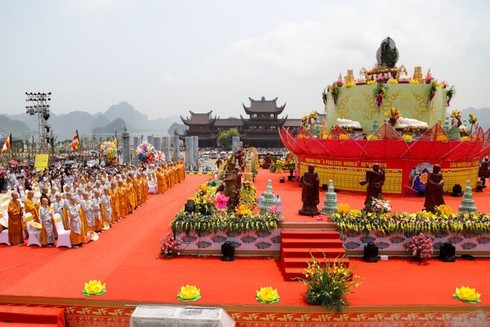Vietnam is a multi-religion country with 43 religious organizations of 16 religions having legal status. Along with the development of religious organizations, the number of religious followers has increased.

More than 95% of Vietnamese people hold some religious belief and more than 27% or 24.3 million people are religious followers. There are 53,000 religious dignitaries and 28,000 establishments of worship. These figures are evidence of the openness in Vietnam’s policies on ensuring freedom of religion and belief.
They also reflect the Vietnamese Party, State, and government’s commitment to promoting a law-governed state for religion. Religious activities are practiced nationwide in diverse forms.
According to Do Quang Hung, head of the Religion Advisory Council of the Vietnam Fatherland Front, religion, belief, and spirits are the three pillars of Vietnamese people’s spiritual life.
"Vietnam is a country where religions are diverse," Hung said. "International research on religion reveals Vietnam is one of the countries typical for religious awareness. Facilities and activities of religious organizations are diverse, meeting people’s demand, and have received international recognition".
Hung further elaborated that Vietnam has also promoted religious activities of foreigners in the country in the last 7-8 years.
"I think it’s a positive move of the Vietnamese State. Foreigners not only practice religion in places of worship, they can also have their own places, or rent places for practicing their religion," he said. "In addition, Vietnamese religious organizations have also enhanced international cooperation. Vietnamese religious people have travelled overseas for medical treatment and participate in religious activities overseas."
The Vietnamese State pursues a consistent policy of respecting and ensuring the right to freedom of religion and belief and freedom of non-belief and non-religion. This is clearly stipulated in the country’s Constitution and law. The 2016 Law on Religion and Belief stipulates citizens’ fundamental right to freedom of religion and belief.
The law has three major changes, according to Hung. First, the people’s right to freedom of religion and belief are better ensured in line with international treaties, Second, the law addresses a series of issues concerning places of worship, land, religious property, and even publication and information issues.
Last but not least, he said, the law legalizes all participants to freedom of religion and belief. Religious organizations have their interests and also their obligations. So have leaders of religious organizations and the Vietnam Fatherland Front, the largest socio-economic organization which oversees and facilitates the realization of laws.
Freedom of religion and belief has been one of the issues that hostile forces take advantage of to intervene into Vietnam’s internal affairs. But the reality of religious practices and activities in the country is a strong response to distortions.
VOV
 Although hostile forces against the Vietnamese Party and State always distort that religion is oppressed in Vietnam, legal religious activities are respected in Vietnam and practiced nationwide.
Although hostile forces against the Vietnamese Party and State always distort that religion is oppressed in Vietnam, legal religious activities are respected in Vietnam and practiced nationwide.